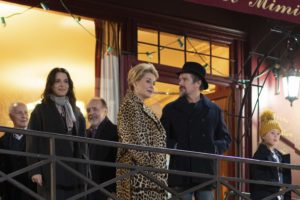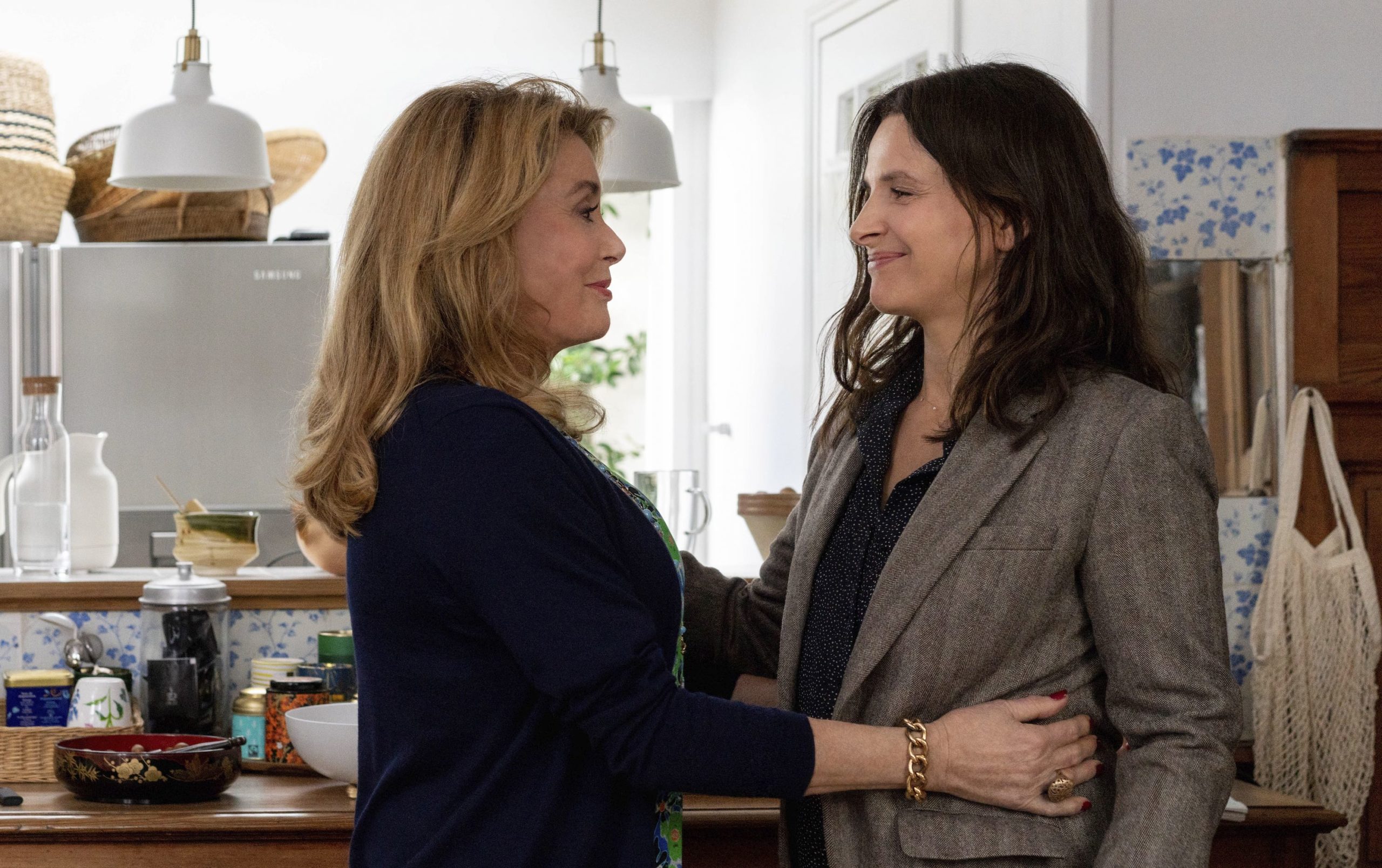There’s a scene early in The Truth, director Hirokazu Kore-eda’s latest film and first directed outside his native Japan, in which Juliette Binoche and her young daughter lie in bed reading a story. “What’s the truth?” Charlotte, the daughter, asks. “What do you think?” Binoche’s Lumir replies.
It’s a warm and fuzzy conversation that takes place in Lumir’s not-so-warm and fuzzy childhood home in Paris. There on an extended visit, Lumir will find herself repeatedly asking that question as she and her husband (a delightfully bumbling Ethan Hawke) celebrate the family matriarch, steely aging French movie star Fabienne—played with delicious magnetism by Catherine Deneuve—upon the publication of her memoir. It turns out Fabienne’s book offers more revisionist history than unvarnished facts, a point of contention that turns up the heat the long simmering tension between the two.
Is Fabienne telling the truth? Is Lumir? Perhaps there’s room for both their competing memories to be real. The truth, after all, is subjective; as Joan Didion once wrote, “Memory conforms to what we think we remember.” Faced with their conflicting narratives, resentments begin to boil over as past mistakes and perceived failures are dragged out into the light again. Unlike most melodramatic mother-daughter narratives, responsibility may be taken—but remorse is nowhere to be found. “I’d prefer to have been a bad mother and a bad friend, but a good actress,” Fabienne says at one point, her voice coolly unapologetic. “You may not forgive me, but the public does.”
With The Truth, Kore-eda’s two points of interest explored throughout his twentieth-century filmography, from Still Walking and Shoplifters, intersect. Honing in on the specificity of mother-daughter relationships, the director probes at how we relate within imperfect family structures and how our memories shape the way we live our lives. After making a slew of heavier films in succession, though, the director acknowledged through a translator that the tone of The Truth is a bit of a departure: “I wanted it to be kind of a light, refreshing film that makes you just kind of want to amble slowly home while you think about it.”
We caught up with Kore-eda to discuss the stage origins of The Truth, the experience shooting in France for the first time, and the collaborative process of working with Binoche and Deneuve.
You had been trying to work with Binoche for several years before this finally got off the ground, right?
It all started, actually, when I went to Paris for the release of my film Still Walking in 2008. I was told that she liked my films and wanted to meet me. And then I hosted a three-hour-long interview with her and we spent some time in Kyoto where we talked about possibly working on a project, possibly including a film in which she might act, and that we might film it in Japan. Ultimately, in 2015, I gave her the outline for this film and that’s when it really became concrete.
Did you plan to do this particular film in French after the outline was put together?
Originally, I had written the story in 2003 as a stage play for a Japanese aging actress who is waiting for her turn on stage. She’s quite selfish and lonely. But then in 2015, I hit upon the idea of adapting it to make it a mother-daughter story, and setting it in Paris, and if I cast Binoche as the daughter, that Catherine Denueve would be perfect as both the mother and the aging actress.
Was this the first time you involved your actors so closely in that kind of collaboration, and how did it shape the film?
Actually, it’s not my first time at all. In Japan, I worked closely especially with actress Kirin Kiki, who recently passed away. I would talk to her from an outline stage and get her input on what was missing from a character and we would develop it together. I really love that development stage so much, so I really worked with the three lead actors to develop the script.
“Really, I made a number of relatively heavy films in succession, so for this film, I wanted it to be kind of a light, refreshing film that makes you just kind of want to amble slowly home while you think about it.”
Were there any insights that they had that you think were particularly meaningful in shaping the film?
One insight, on Binoche’s part, that really stays with me and informed the film—although it’s not a direct line of dialogue in the film—was as Binoche was analyzing Lumir’s character, it occurred to her that her mother, Fabienne, may have given birth to her so that she knew how to play the role of a mother on camera. It occured to me that Fabienne might just do something like that, and that kind of insight stayed with me and helped me to really shape the characters.
In terms of Deneuve, after we did the read-through of the script, her insight was that, because Sarah’s [a rival of Deneuve’s character who died prior to the film’s timeline] ghostly presence really haunts the characters, she needed to be positioned as a slightly more important person within the family structure. And so, I think they made her like a godmother character to Lumir, and that was Catherine’s suggestion. From my understanding, Deneuve is able to take a critical distance from the entire film she’s in and not just see her role, but the whole structure of the film, and she often had helpful comments about scenes that she wasn’t in.
Speaking of Deneuve, there are so many small references to her career and her life—it’s such a love letter, in a way. What was it like crafting that? Did you always have her in mind for this character?
Originally, in the stage play, of course I wrote it for a Japanese actress and for it to be played as a Japanese actress. But once I decided to adapt it to France in 2015, it seemed to me that Deneuve was really the only actress who could pull this off. So it is, in many ways, written as an homage to her.

Can you tell me a little bit about the process of making it in France? What differences or challenges, particularly with the language barrier, did you encounter?
Language was not so much as a problem, especially because I had a very, very fluent, completely bilingual person working with me throughout the year. What was, initially, a source of stress was the production hours in France. You can only film eight hours a day, and Saturdays and Sundays are completely off. Catherine Deneuve only showed up at noon, and children can only work for four hours at a time. So, ultimately, obviously, it was a much healthier physical and emotional situation for everyone involved. I didn’t get sick during production. And looking back, it’s the Japanese hours that are a little insane and overworked. But it took me a little to get used to it.
So many of your films are about familial relationships, whether biological or found-family. What interested you in this situation to really go deep, specifically on a mother-daughter relationship?
I wasn’t actually planning to make this as a family drama; the original stage play was really just about one actress who is relating to her rival who has passed away a long time ago. I wanted to make the play about acting itself. But once I decided to relocate it and adapt it to Paris, I came up with the idea of her having a daughter who wasn’t able to become an actress, but then having the granddaughter with her grandmother’s DNA, who is on her way to becoming one, and the men in their lives, including her secretary. It didn’t at all start out, in my mind, as a family story. Really, I made a number of relatively heavy films in succession, so for this film, I wanted it to be kind of a light, refreshing film that makes you just kind of want to amble slowly home while you think about it.
Speaking of the granddaughter, it seems as if you use her to show the way we interact differently through familial generations. Fabienne and her daughter interact in ways that make the viewer unsympathetic to Fabienne, but then from the ways Fabienne can relate much more easily with her granddaughter, it becomes clear that she’s not all bad.
“Once I decided to adapt it to France in 2015, it seemed to me that Deneuve was really the only actress who could pull this off. So it is, in many ways, written as an homage to her.”
I was interested in using intimate scenes between a mother and a daughter as a metaphor for other possible moments from the past. For instance, when Lumir and Charlotte are reading the book in bed, it’s a scene that could have unfolded between Fabienne and Lumir in the past. Or, the hair brushing scene between Charlotte and Fabienne—it might have been such a scene from Fabienne and Lumir in the past, or maybe not.
Our memories are fallible and truth is subjective; we all have our own version of it. What about that is interesting to you that made you want to explore that in this film?
Yes, as you say, memory is quite subjective and the same event can be interpreted and remembered quite differently with different associating emotions, depending on the individual. But I was interested, specifically, in our human ability to rewrite memories. That is, of course, you know, if you rewrite history, that can be negative. But during the one week that the daughter and her family spends at home, it seems that the mother and daughter are able to rewrite their conflicting memories in order to approach some kind of a resolution. In this film, I wanted to treat that as something positive—that you can rewrite memories.
You’ve been outspoken in the past about the challenges of working within Japan’s film industry and the inadequacies of the Cool Japan initiative, which have come up in the discourse again recently. Is that something that influenced your choice to work elsewhere with this film, or will this experience inform what you do next? And what do you think needs to be done to support artists, specifically in Japan, in a better way?
Well, at least in Japan, there’s an understanding that people are working too hard all over the country and that they have to change working conditions. I actually recently testified at a government hearing about my experience in France and how, specifically, the eight-hour day and two days off a week, allows single mothers in France to work in the movie business. They can pick their children up after a filming day is over and feed them at home. In Japan, given the working hours and conditions, really, if a woman has a child, she has to leave the business. So, I’m really trying to see what we can do, specifically on my next film set, to try to incorporate some more of the French approaches so that women can have more sustained careers in the business, even if they chose to have children. FL









